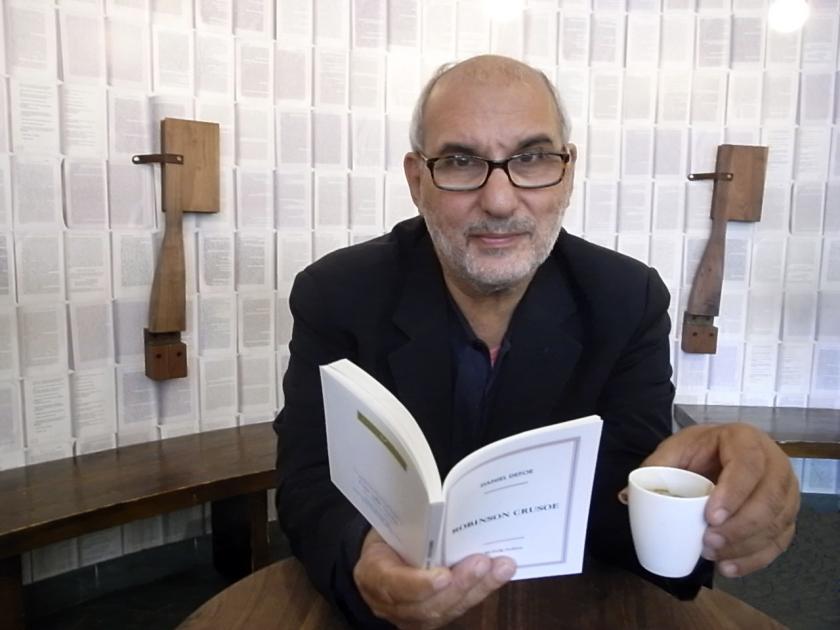“Will the app clicker replace the page turner?” asked Alan Yentob’s state-of-play rumination on the book. It’s a cutely phrased question and, as everyone reading this will be familiar with the digital world – this is theartsdesk, after all – a fair one. Will zeroes and ones make the book redundant, a sort of totem, or will it adapt, taking on the new forms presented by the digital world? The programme didn’t answer the questions, but at least it did show the possibilities.
A hunt around the BBC’s various websites revealed that Books – the Last Chapter? was known as Books –the End of the Affair? before it was broadcast. The change in title shifted the emphasis from the death of the book itself to the evolution of what makes a book a book. Obviously, the object that is the book has a diminished future but the words, the content, will always survive whatever the medium of delivery. Equally obviously, Marshall McLuhan was going to crop up – so he did. It’s easy to disagree with McLuhan’s maxim that society is shaped more “by the nature of the media by which men communicate than the content of the communication”. But seeing a row of tablet readers being stared at on an underground train causes a jolt.
Will the book be lost to a world of keyboard (and app) clickers?
Alan Yentob opened his film with the travelling library, the shelves-on-wheels service that’s many rural community’s access to books en masse. It’s also a social hub and the travelling librarian knows his clientele so well that he offered advice on how to download books when asked. He never saw the 85-year-old questioner again.
Will the book be like that man: gone, lost to a world of keyboard (and app) clickers? Yentob drew parallels with photography and the dial phone, but he kept returning to the vinyl album. He might have chosen the CD, but that’s a digital step too far.
'If you get hung up on the object, you can’t go forward,' declared one gung-ho post-book typeThe parallels with what’s happened to recorded music are clear, but even so it was strange – very late in this game-changed world – to hear publisher Gail Rebuck and agent Ed Victor talking of adapting and the exciting future. Shouldn’t they have adapted and embraced the future already, even if only to ensure their own survival? Victor was even woollier saying Amazon, Apple and Google are the monoliths that dominate the book’s future and then quoting William Goldman saying, “Nobody knows anything.” So what does Victor know? The faces of some of his clients must have turned grey on hearing this.
But there were rafts of gung-ho post-book types on hand, not only living in the now but in the future, too. “If you get hung up on the object, you can’t go forward,” declared one. Bob Stein was from something called the Institute for the Future of the Book. A dyed-in-the-wool McLuhanist, he said, “The value of content is heading towards zero.” Tell that to an author who’s spent the last year writing and polishing that content. The question of “what added value comes from the printed page?” was asked. Isn’t the printed page itself enough? Many of the future embracers seem only this far from the book burners in Ray Bradbury's Fahrenheit 451 (which Yentob brandished at one point).
Watch book burning in François Truffaut's 1966 film of Fahrenheit 451
Slightly less worrying was the Californian project to scan every book there is and make it available for download while keeping a copy of each book in an archive. But that has the side effect of fetishising the book, making it into a museum piece and negating its ubiquity as a day-to-day object. To ensure this, author Julian Barnes said the book “has to look like something worth buying and worth keeping”. It still needs content though.
The programme finished with Yentob in a bookshop, buying a print-on-demand version of a vintage edition of Robinson Crusoe. It looked like a book, it smelt like a book. It was a book. Earlier he’d said that “books have shaped the world”. They will continue to do so, but this maddening – and no doubt it was meant to be maddening – programme didn’t tell us how.
“All that technology has done is offer us a choice,” he opined. “Who’s to say what strange and surprising adventures await us there?” Asked what book he’d be, Yentob said Candide. Voltaire ridiculed optimism, so one can only assume that Yentob doesn’t hold much hope for the book’s future.















Add comment